#nikolay pavlovich
Explore tagged Tumblr posts
Text






today's Бесы | Demons (2014) doodles
#rin's stuff: my art#demons#demons (2014)#the possessed#fyodor dostoevsky#nikolai vsevolodovich stavrogin#pyotr stepanovich verkhovensky#ivan pavlovich shatov#russian literature#artists on tumblr#maksim matveev
93 notes
·
View notes
Text

hitting demons with the will wood beam. it is so over for me
#pyotr verkhovensky#pyotr stepanovich verkhovensky#nikolai stavrogin#nikolai vsevolodovich stavrogin#ivan shatov#ivan pavlovich shatov#alexei nilych kirillov#alexey kirillov#darya pavlovna shatova#darya shatova#lizaveta tushina#liza tushina#lizaveta nikolaevna tushina#the demons#the possessed#fyodor dostoevsky#russian literature#russian lit#i do not know what i did there with the colours
83 notes
·
View notes
Text

shatovrogin as kids omgeeeee
#art#dostoevksy#demons#demons dostoevsky#the possessed#ivan shatov#nikolai stavrogin#ivan pavlovich shatov#nikolai vsevolodovich stavrogin#i will kms soon#eat dick all day
52 notes
·
View notes
Text

Nikolai Pavlovich Sablin, commander of the imperial yacht "Standart", Grand Duchess Anastasia Nikolaevna, Tsarevich Alexei and Tsar Nicholas II of Russia, 1910.
16 notes
·
View notes
Text
Back on the grind to make content for a ship 3 people care about

#shatovrogin save me aave me#today was just them them them#the possessed#dostoevksy#dostoevsky#dostoyevski#fyodor dostoevsky#demons#biesy#besy#ivan shatov#shatov#ivan pavlovich shatov#nikolai stavrogin#nikolai vsevolodovich stavrogin
16 notes
·
View notes
Text
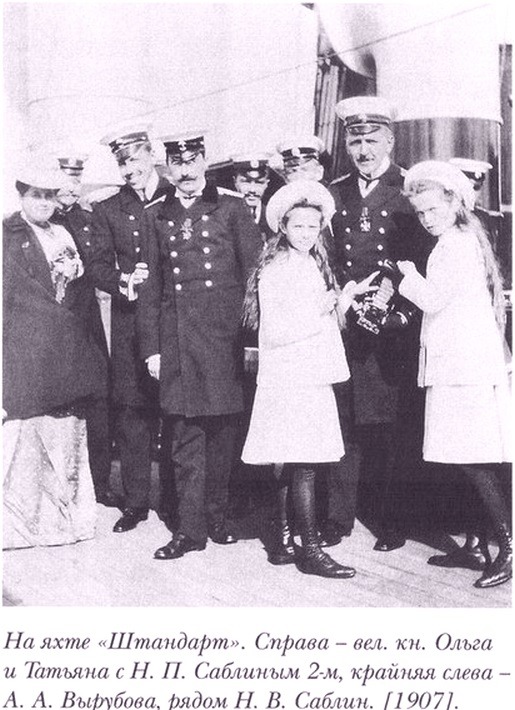


Tatiana and Olga with N. P. Sablin. Anna Vyrubova and N. V. Sablin on the left. Standart, 1907.
#otma#romanov#olga nikolaevna#tatiana nikolaevna#nikolai vasilivich sablin#nikolai pavlovich sablin#anna vyrubova#standart
13 notes
·
View notes
Text

Grand Duchess Anastasia “Shvybzik” Nikolaevna funnily being pushed off of a chair while her elder sister Grand Duchess Olga Nikolaevna watches on, Finland 1909-1910 🤍🤣✨
People in the background for whom I can identify: Anna Vyrubova, Nikolai Pavlovich Sablin, Pavel Voronov
#lmao 🤣🤣🤣#olga nikolaevna#anastasia nikolaevna#shvybzik#otma#romanov#romanovs#romanovs being funny#russian history#russian imperial family#anna vyrubova#pavel voronov#Nikolai Pavlovich sablin#1909#1910#finnish skerries
58 notes
·
View notes
Text

Grand Duchesses Olga, Marie, Tatiana and Anastasia Romanov, Alexander Ivanovich Butakov, Nicholas Nikolaevich Rodionov, Anna Vyrubova and Nikolai Pavlovich Sablin in Livadia, 1912.
#OTMA#Olga Romanov#Tatiana Romanov#Maria Romanov#Marie Romanov#Romanov#Romanovs#Anna Vyrubova#History
42 notes
·
View notes
Text
~ ❦ Happy 129th Birthday to Grand Duchess Olga Nikolaevna of Russia! Born: November 16th 1895 ~
~ To celebrate her birthday here is an edit (made by me using CapCut Pro) and some of my favorite quotes said by her ♡
❦ “Sleep well and have a good dream, i.e. Nik[olai]. Dm. [Demenkov - Maria's crush] (idiot)…Well, good night, I kiss you and pat you on your chubby, appetising cheeks.” - O to M, 13th Nov. 1914
❦ "I am sitting in Mr. Gilliard's rooms near the door of his water-closet where Trina's little nasty girl Katya is sitting locked in by Anastasia and myself. We've just drawn her along the dark passage and pushed her in." O to Nicholas, 9 Oct. 1915
❦ “… Austria declared war on us. Bastards” - O’s diary, 24 July 1914
❦ “…Regards to Nikolai Pavlovich. Tell him that he is because he did not even write once…” - O to Nicholas, 21 June 1915
❦ “Olga Nikolaevna threw all her things around from delight, and threw a pillow up on a top shelf. She felt feverish and she jumped around: “‘Can someone have a stroke at 20 years old? I think I am having a stroke!’” Memoirs of Valentina Ivanovna Chebotareva
❦ “…all (was/ as usual, a lot of running around, but I love it. Makes me feel like I am accomplishing something…” O’s diary, 11 Sept. 1916
❦ “Father asks to have it passed on to all who have remained loyal to him and to those on whom they might have influence, that they not avenge him; he has forgiven and prays for everyone; and not to avenge themselves, but to remember that the evil which is now in the world will become yet more powerful, and that it is not evil that conquers evil, but only love.” - Olga basically writing NAOTMAA’s last will and testament 1918
✧.* ♡ *.✧
#I always whip out the good stuff for my girl 💕#happy birthday Olga!!!#🩷🤍#olga nikolaevna#otma#romanov#romanovs#grand duchess olga nikolaevna#grand duchess Olga nikolaevna of Russia#grand duchess Olga#my edit#made by me#Romanov edit#olga romanov#capcut#otma edit#Romanov family#russian imperial family#russian history#Ольга Николаевна#grand duchesses#Olga nikolaevna of Russia#november 16#November 16th 2024#1895
43 notes
·
View notes
Text

“I was not born to amuse the Tsars.” ― Alexander Pushkin
Painting: "Russian poet Alexander Pushkin and his wife Natalia Gontcharova at the Anichkof Palace Ball." by Nikolai Pavlovich Ulyanov
#albert camus#franz kafka#poetry#classical quotes#sylvia plath#literature#quotes#classics#classical literature#booklr#alexander pushkin#tolstoy#dostoevksy#anna karenina#poetic#poem#writers and poets#nietzche#the stranger#lit#russian literature#classic literature#literary quotes#book quote#bookblr#books#book quotes#jane austen#romantic academia#classical poetry
76 notes
·
View notes
Note
Hey I wonder, how many branches are there in the Romanov family, anyway?
It depends on how you want to divide them up!
Most historians tend to do it by the sons of Nicholas I, so we end up with: The Alexandrovichi - Alexander II and his descendants. This group is sometimes subdivided by Alexander II's sons, so we have the continuation of the Alexandrovichi with Alexander III, and then the Vladimirovichi (descendants of Vladimir Alexandrovich) and Pavlovich (descendants of Pavel Alexandrovich). I don't tend to label things as 'alexandrovichi' because they're the main line of the Imperial Family.
The Konstantinovichi - Descendants of Konstantin Nikolaevich. This can include the Greek Royal Family as their founding matriarch was Konstantin's daughter, Olga Konstantinovna. But usually people think of the poet Konstantin Konstantinovich (KR) and his many children.
The Nikolaevichi - descendants of Nikolai Nikolaevich Sr. He only had two children, Nikolai Nikolaevich Jr (Nikolasha) and Peter Nikolaevich, and of the two, only Peter had children of his own, so it's a small branch.
The Mikhailovichi - the descendants of Mikhail Nikolaevich. This includes Sandro, the husband of Nicholas II's sister Xenia, so her kids are technically part of the Mikhailovichi branch but you could argue they are Alexandrovichi through their mother. Also OTMAA's playmates Nina and Xenia Georgievna are in this branch.
Another major branch are the Leuchtenbergs, who are the descendants of Nicholas I's daughter Maria and her husband Maximilian of Leuchtenberg. They lived in Russia, were granted the style of Imperial Highness, and while their title was Prince/ss Romanovsky, they were essentially treated like Grand Dukes/Duchesses.
19 notes
·
View notes
Text
today's shower thoughts are about this random-ass detail about the stavrogin-gaganov beef (the duel) — even before things went down, gaganov got outright PISSED at stavrogin (more than he already was) arriving at the scene on horseback and not by carriage, because it implied that he (stavrogin) was confident that he won't get injured so severely by gaganov that he'd need to be transported in a safer, more elaborate ride. and like just. damn. artemy pavlovich hated him so fucking bad 😭
#at least you nicked him buddy#he bled and you didn't and that's what matters most#plus you ruined his hat#that's something#rin's ramblings#demons#the possessed#devils#fyodor dostoevsky#nikolai vsevolodovich stavrogin#artemy pavlovich gaganov#russian literature
17 notes
·
View notes
Text
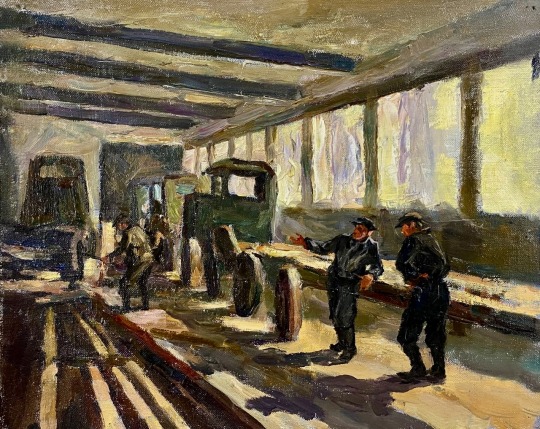
Solonitsyn A.P. 1950-1960s. GZ23 Canvas on cardboard, oil. Size 27.5x33.5 cm.
Arkady Pavlovich Solonitsyn was born in 1927. Graduated from the Saratov Art School. A student of the famous artist Nikolai Gushchin. Then he graduated from the I.E. Repin Institute of Painting, Sculpture and Architecture of the Academy of Arts. Worked in the Art Fund of the RSFSR. Participant of numerous exhibitions in Russia and abroad, as well as European auctions. Lives and works in St. Petersburg. The artist's works are in private collections in Germany, France, Japan, China, Korea and Australia.
Art Molotok
5 notes
·
View notes
Text
"In St. Petersburg we work, but at Livadia, we live."
Grand Duchess Olga Alexandrovna
In 1909, Nikolay Krasnov, who was responsible for the Yousupoff Palace in Koreiz, was engaged to design a new imperial palace in Livadia (before that, there had been an imperial residence in Livadia consisting of a large and a small palace used by Alexander II and later by Alexander III, who died at the smaller residence.) When Nicholas II decided to build the new palace, he also demolished the older residence but left the small palace where his father died.
The Tsar's diary indicates that the Imperial Family discussed the design; it was decided that all four façades of the palace should look different. After 17 months of construction, the new palace was inaugurated on 11 September 1911. In November, Grand Duchess Olga Nikolaevna celebrated her 16th birthday at Livadia.
The family was always the happiest at Livadia.
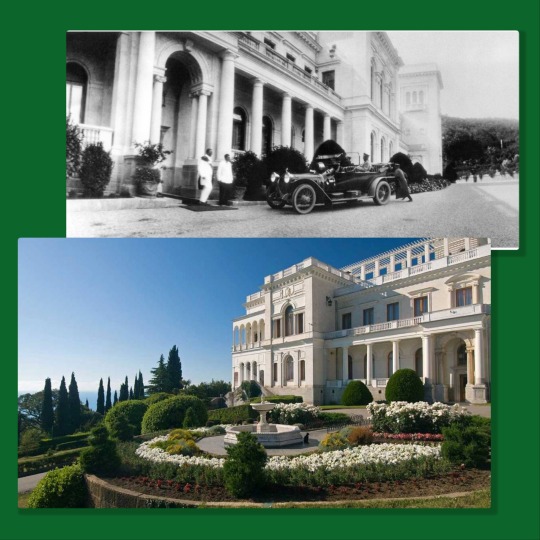
One of the Tsar's "motors" at Livadia. If you look carefully, you can see the "side of the palace" where the car is parked and the main entrance in both the contemporary colored and black and white photos.
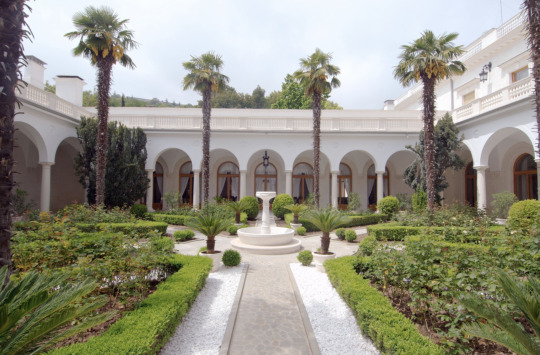
Above is the beautiful Italian Courtyard of the palace as it stands today. If you look at pictures taken when the Romanovs used the palace, the centerpiece of the courtyard was different. Today, there is a fountain at the center. Examining the older pictures (below), you can see that there seemed to be what I can only describe as a "well" at the center of the courtyard. There was a column on each side of the well. In one of the photos below, you can see Grand Duke Dmitry Pavlovich; he had his own rooms at the Livadia Palace.
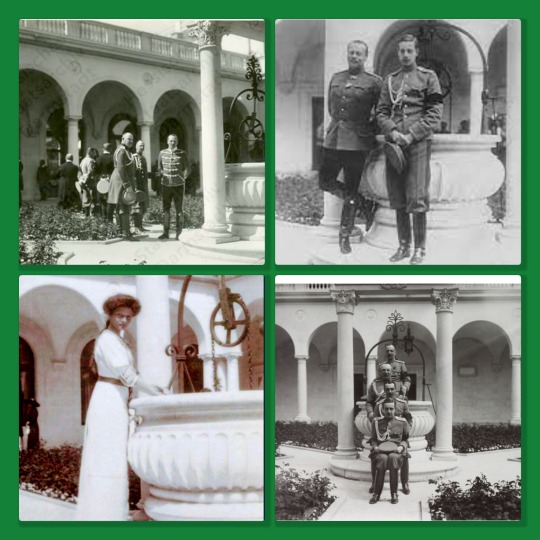
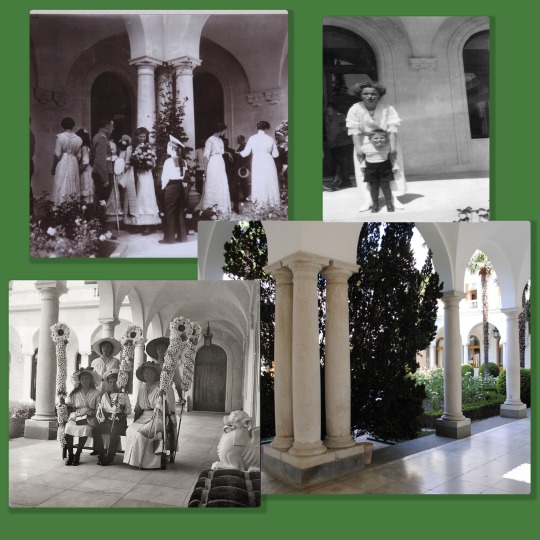
Nicholas II and his family were so at ease at Livadia that they also conducted some minor official functions in addition to family activities. When the family went to Livadia, they usually went as far as Yalta by sea; it is easy to infer that the official activities they conducted were related to the crew of the Standart. In addition, at the time, it was believed that mountain air and rest could cure tuberculosis, and there were several spas and sanatoria in the mountains in the area. The Empress and the girls visited the sick there (they also participated in other charitable activities.)
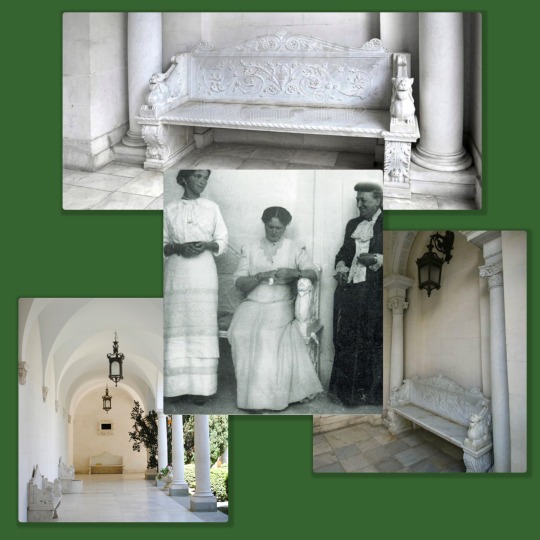


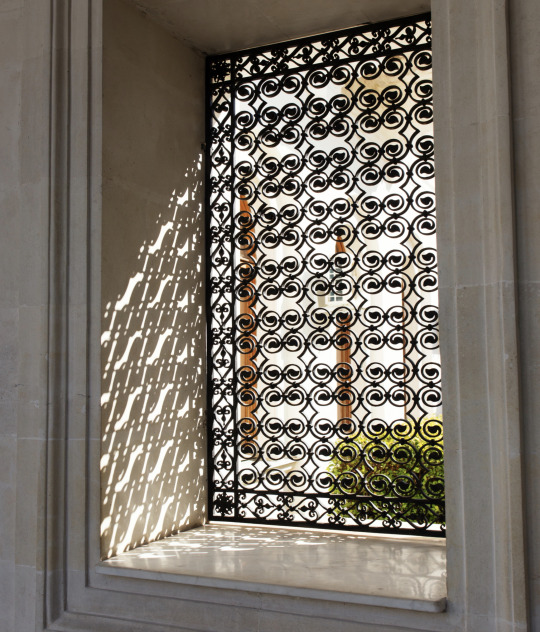
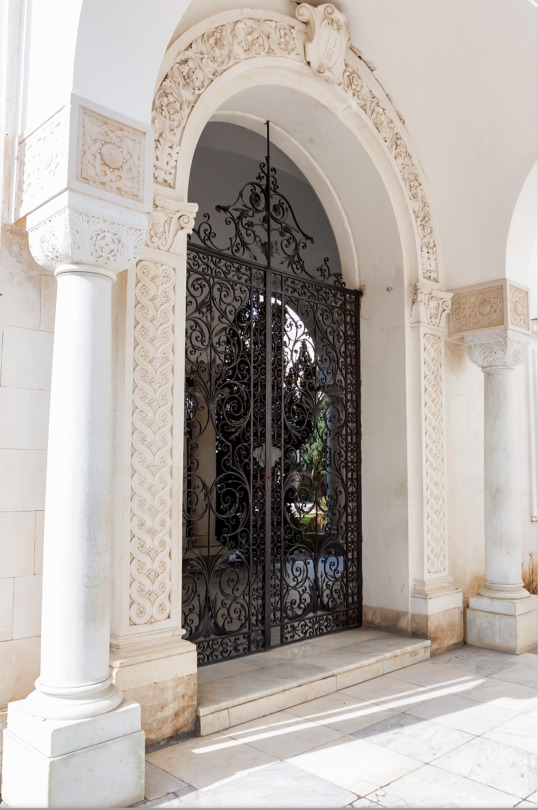
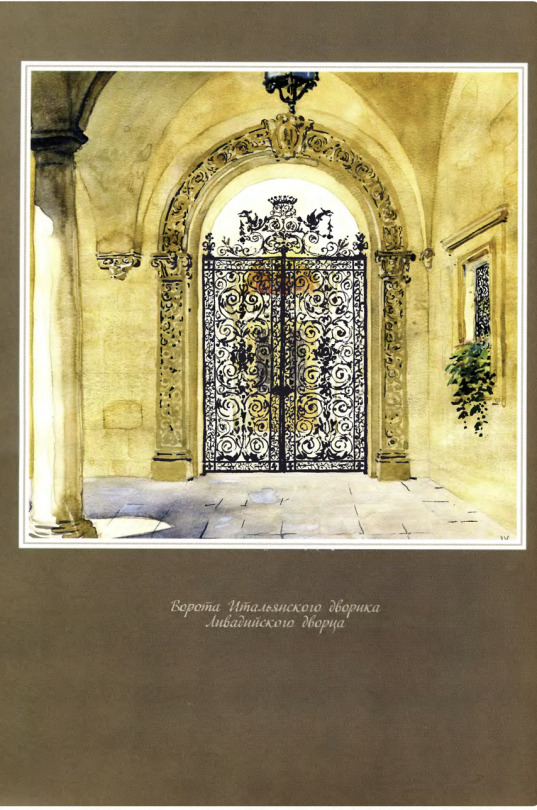
The Yousupov family gifted the beautiful door above to Nicholas and Alexandra. The painting next to it is from a beautiful book by Kravnov ("Fiftieth Anniversary of Yalta"), who worked on the palace's design (and on that of the Crimean summer residences of several Grand Dukes.) The window is also featured in the painting.
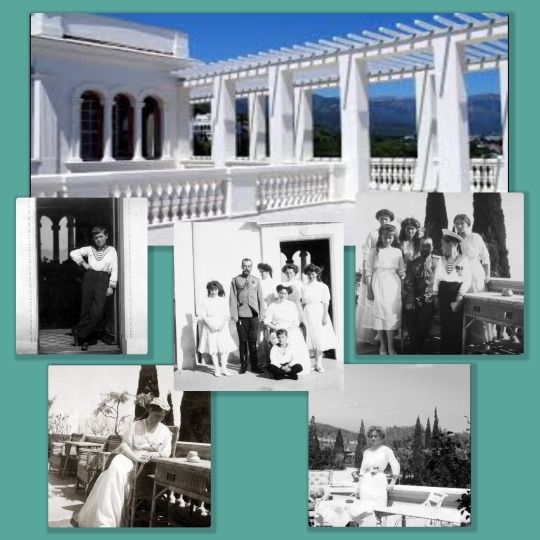
The "solarium" seems to have been a very popular area. Nicholas and his children preferred the outdoors, and Livadia seemed to provide the Empress with the perfect environment to get sun and fresh air in comfort regardless of her many ailments.
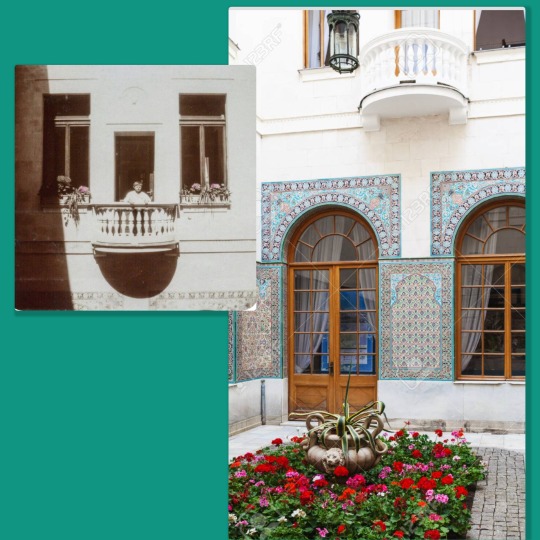
This is the "Moorish" courtyard of the palace. It is small, but notice the exquisite tilework on the walls. And, of course, the little balcony between the windows seemed perfect to Alexis for him to "address" his family.
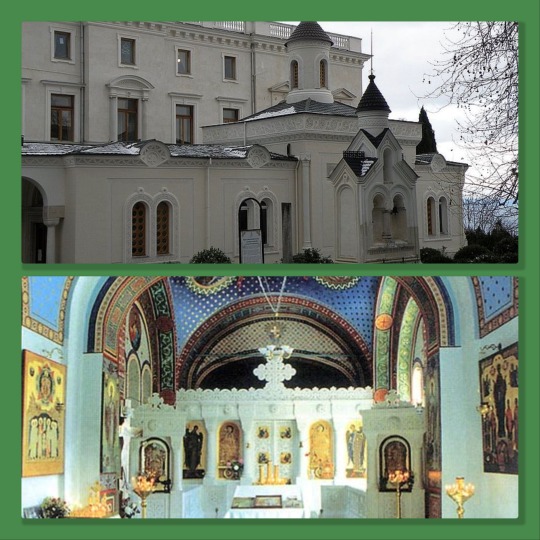
The palace had a chapel so that the Romanov family could worship in privacy.
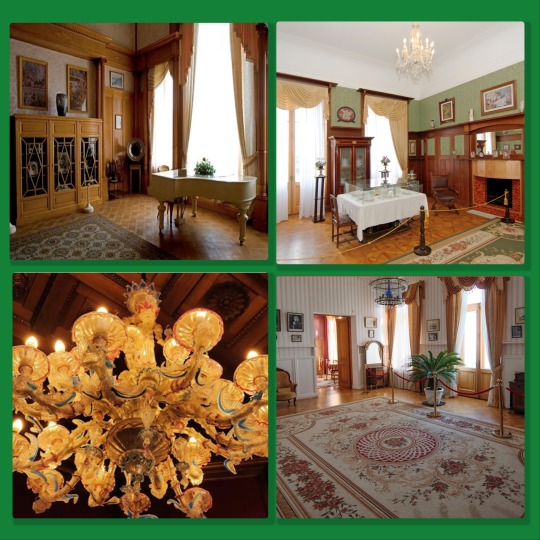
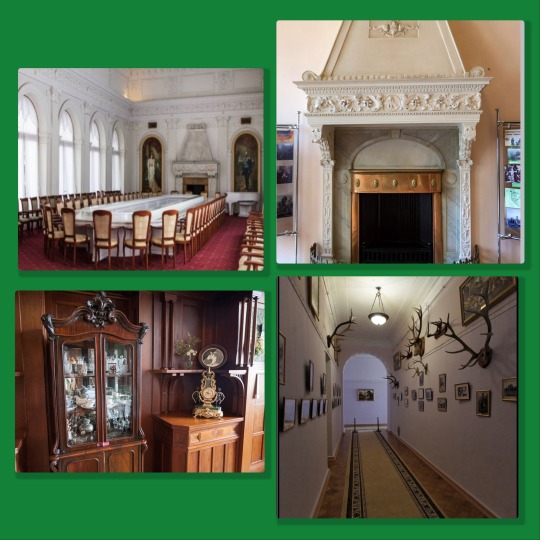
A few of the interiors of the palace. The chandelier is Murano Glass (amazing that it survived all these years.) Olga's coming-of-age celebration took place in Livadia in the formal dining room in the photograph above, dancing spilling into the flower-perfumed courtyard. That is a luxury of the type you cannot buy! The girls' rooms are currently being restored. There are pictures of the rooms as they were, but I was not sure they were from Livadia, so I did not include them.
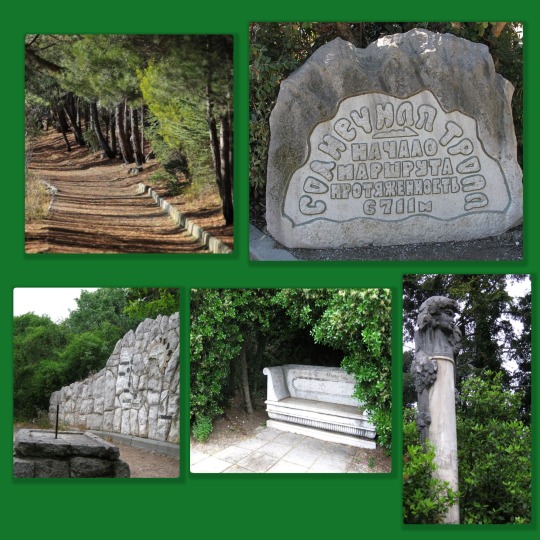
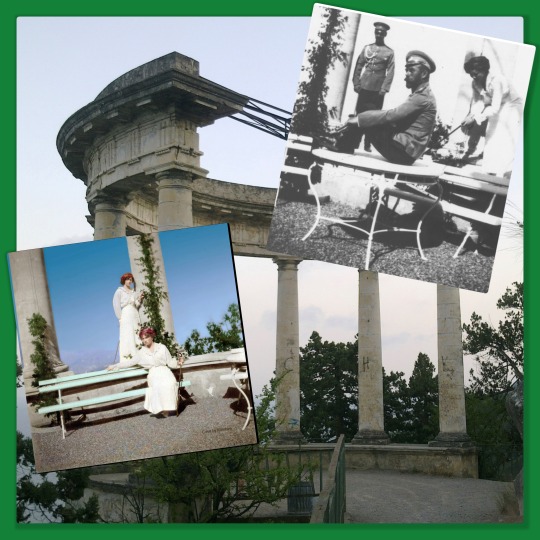
Finally, some photos of the "Tsar's Path" (or Sunny Path), which exists to this day (it goes from Livadia Park to the city of Gaspra.) The family loved to walk this path (regardless of its name, it is not sunny but pleasantly breezy). This path is on one level so that anybody can walk it, regardless of their cardiovascular status. I have read two stories about how it "emerged," and as usual, the truth is probably in the middle. First story: The new Livadia Palace did not exist yet, but the Romanovs used the old palace and always loved coming to Livadia. Alexander III kept gaining weight, and his doctor recommended that he walk but not overdo it...so Alexander had the path leveled. The path's beginning and end differed from what they would be later. Second Story: Sandro had the path from Ay Todor toward Livadia built because Nicholas and Sandro's families always visited each other (they started calling it the Prince's Path.) Nicholas loved the idea and extended the path.
Today, the main path remains, and other routes to other small towns can be hiked from it. Many of the same benches and sculptures are where they were at the time of the Romanovs.
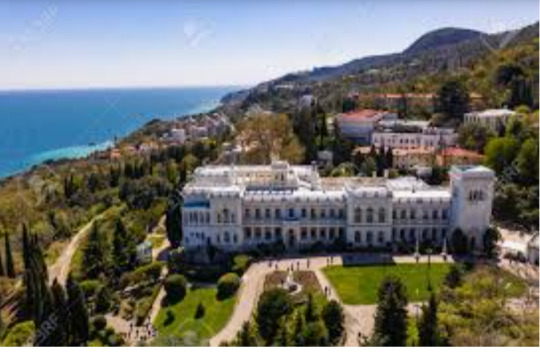
Just one last photo. Here, you can see how close the palace is to the mountains and the sea. A beautiful big house full of fresh air and light with flowers perfuming the air. No wonder Olga liked it so much! (gcl)
#russian history#romanov dynasty#nicholas ii#otma#Empress Alexandra Feodorovna#Emperor Alexander III#Grand Duke Alexander Mikhailovich#Ay Todor#Nikolay Krasnov#grand duchess olga nicholayevna#Grand Duchess Tatiana Nicholayevna#Grand Duchess Maria Nicholayevna#Grand Duchess Anastasia Nicholayevna#Tsarevich Alexei
64 notes
·
View notes
Text

Alexandra with Nikolai Pavlovich Sablin on the balcony of the Alexander Palace.
7 notes
·
View notes
Text
2025 Translation Tuesday Entry - 09/52 Title: Алексеев (Alekseev) Artist: Центр (Tsentr) Album: Сделано В Париже (Made in Paris, 1989)
-------------------
Алексеев Николай Петрович, доктор. (Alekseev, Nikolai Petrovich: doctor.) Алексеев Фёдор Степанович, инженер. (Alekseev, Fyodor Stepanovich: engineer.) Алексеев Сергей Иванович, агроном. (Alekseev, Sergei Ivanovich: agriculturalist.) Алексеев Владимир Павлович, шофер. (Alekseev, Vladimir Pavlovich: chauffeur.)
Алексеев Иван Кузьмич, дизайнер. (Alekseev, Ivan Kuzmich: designer.) Алексеев Андрей Васильевич, министр. (Alekseev, Andrei Vasilyevich: minister.) Алексеев Мефодий Игоревич, профессор. (Alekseev, Mefodii Igorevich: professor.) Алексеев Аркадий Фёдорович, менеджер. (Alekseev, Arkadii Fyodorovich: manager.)
Алексеев Валерий Сергеевич, директор. (Alekseev, Valerii Sergeevich: director.) Алексеев Максим Григорьевич, генерал. (Alekseev, Maksim Grigoryevich: general.) Алексеев Юрий Ильич, эмигрант. (Alekseev, Yurii Ilych: emigrant.) Алексеев Александр Николаевич, политик. (Alekseev, Alexandr Nikolaevich: politician.)
Алексеев Степан Мефодьевич, металлист. (Alekseev, Stepan Mefodyevich: metal-worker.) Алексеев Фёдор Владимирович, турист. (Alekseev, Fyodor Vladimirovich: tourist.) Алексеев Константин Борисович, детектив. (Alekseev, Konstantin Borisovich: detective.) Алексеев Олег Анатольевич, спортсмен. (Alekseev, Oleg Anatolyevich: athlete.)
Алексеев Антон Васильевич, активист. (Alekseev, Anton Vasilyevich: activist.) Алексеев Дмитрий Феликсович, космонавт. (Alekseev, Dmitrii Feliksovich: cosmonaut.) Алексеев Алексей Алексеевич, солдат. (Alekseev, Aleksei Alekseevich: soldier.) Алексеев Максим Павлович, коммунист. (Alekseev, Maksim Pavlovich: communist.)
---------------
I'm as confused as you are. 😂
Центр (Tsentr, 'Center') are... strange. I'm genuinely struggling to describe what their musical genre(s) are, indeed if they can be labeled under certain genres.
Begun by Vasily Shumov (b. 1960) in the late 70s, Tsentr has a long history both as a band and as part of Shumov's individual artistic endeavours. Like many groups of this era, their line-up has had musicians come and go (check out that graph!), and in the time period we're interested in - Tsentr's beginnings to the end of the USSR - they were famous in the underground rock scene. They were one of the early experimenters of electronica, and have written music for TV, film, and animation as well as their usual output.
But you're not here to read a general introduction. You want to know what the hell those lyrics are about. 🤪 This is actually the song that first introduced me to the band: it came on through an eclectic international radio station I'd had on in the background while working, and about eight lines through 'Алексеев' I started thinking surely not. This cannot be the actual lyrics to the song.
Lo and behold, it was. This is not an April Fool's joke. It is a list of people named Alekseev, yes, these lyrics are played completely straight, and yes, Tsentr's songs are just like that. This isn't the first time Vasily Shumov has done a song in list form, it's not even the first song to do that in this album. In at least one concert Tsentr was offering a free album to anybody with the surname Alekseev, before performing a variation of this song with about fifty Alekseevs on the list. (The official version ends at twenty.) It's a great structure they've got going - there are theoretically infinite Alekseevs out there with all manner of professions. This song could go on forever and remain fresh and new, no matter how many Alekseevs have been introduced up til that point.
I suppose the only thing to ask, then, would be... why?
If I was to describe Tsentr's 1980s output in one word, it would be deadpan. You never get the sense that they're fazed by anything, not within their sung universe nor outside of it. Many of their lyrics seem ridiculous at first, since the songs tend to have a bizarre narrative or no narrative at all. Shumov sings them, nevertheless, with a complete objectivity comparable to Kraftwerk's 'I'm the operator with my pocket calculator / I am adding / and subtracting'. Tsentr's vocabulary can be as simple:
Матрёшка. Балалайка. Волга. Изба. (Matryoshka. Balalaika. Volga. Log hut.) Борщ. Самовар. Спутник. Блины. (Borshch. Samovar. Sputnik. Pancakes.) Навсегда, навсегда. Всё наше навсегда. (Forever, forever. All that is ours, forever.) [From 'Навсегда' ('Forever'), 1989, linked above.]
Or it can be metaphorical and rambling, resembling detached spoken-word poetry more than anything else:
И когда в океанах любви поселились акулы секса (And when the sharks of sex settled into the oceans of love) Русалок нежные плавники стали похожи на пистолеты (The tender fins of the mermaids began looking a tad like pistols) [From 'Новая земля' ('New Land'), 1982]
This whole period, of course, comprises only about a fourth of Tsentr's output. They still making music today. Shumov is 65 this year and set to release an album commemorating this soon (В 65 вам сверхранняя электроника / At Sixty-Five You've Got Super-Early Electronics), according to the official site. [Note: As of 1st April 25, the album is now out!] Their lyrics become clearer and better explained past the 90s, although still somewhat bizarre.
But in terms of their Soviet-era output specifically, I think what they were trying to do was double-voicing. Repeating verbatim official (i.e. the government's) utterances, naming things that were culturally and stereotypically 'theirs', making lists of everyday people in their everyday professions devoid of all other context, in a deadpan and indifferent tone precisely in order to highlight the absurdities latent in those facts.
I don't want to say this was purely for the sake of sarcasm, or that criticism of Soviet society was the whole point, because I'm not convinced these are the most important facets of their work. I think Shumov was trying to demonstrate something broader about reality, the inadequacy of words in conveying the world around us: national identity becomes a simple checklist, people on all walks of life reduced to a census of Alekseevs, and (this is one of my other favourites) in one notable case, the natural world dryly transformed into a case for the moral and pragmatic relativism of the songbird:
С утра мешают спать нам крики вороны (In the mornings the cries of crows disturb our sleeping,) А ночью пугают в лесу пролетающие совы (And at night the owls flying by in the forest frighten us.) Много известно о птицах, как о переносчиках болезней (Much is known about birds as the carriers of diseases:) Поэтому польза и вред певчих птиц – понятия относительные (Thus the benefits and harms of the songbird are relative concepts.) [From 'Жалобы' ('Complaints'), 1989, linked above.]
You love to see it! 🙃
#русский тамблер#langblr#russian language#russian music#Центр#tsentr#Алексеев#alekseev#russian translation#translation tuesday#audio#translation
5 notes
·
View notes